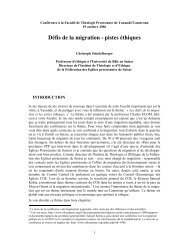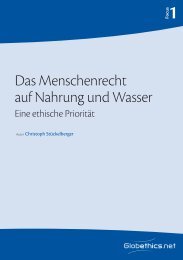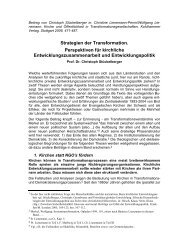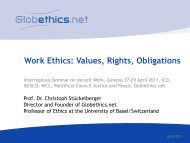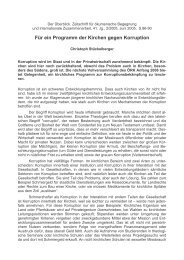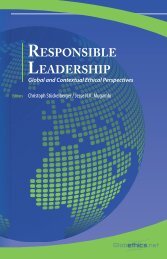BREAK THE CHAINS OF OPPRESION AND THE YOKE OF ...
BREAK THE CHAINS OF OPPRESION AND THE YOKE OF ...
BREAK THE CHAINS OF OPPRESION AND THE YOKE OF ...
You also want an ePaper? Increase the reach of your titles
YUMPU automatically turns print PDFs into web optimized ePapers that Google loves.
Litur gy<br />
In the liturgy of Holy Communion the drama of salvation is re-called and played<br />
out with the assembled congregation as active participants in that drama, not as<br />
passive recipients of an act done to them. If the theological issue of Christ’s real<br />
presence in the sacrament is to hold true then it is real for those assembled in<br />
that act. Each individual gesture, each individual word, reading, prayer and<br />
hymn is then part of that playing out of the drama of salvation.<br />
In that drama of salvation we gather as did the first disciples in the company of<br />
those who are not just. The only just person present in this act is Christ. Fraudsters,<br />
adulterers, child abusers, liars, betrayers, social climbers, greedy bankers,<br />
heartless elders and careless ministers - sinners great and small are gathered<br />
around that table knowing themselves not to be just but trusting themselves to<br />
be justified in Christ.<br />
This gathering of the unjust around the table is sign and symbol for a new reality<br />
in Christ which will find its fulfilment and completion one day which is not<br />
yet.<br />
But the sign and symbol and the participation in the drama of salvation requires<br />
that those who have assembled round the table then seek to express that future<br />
reality already today and begin to enact the ethical consequences for living of<br />
that drama of salvation not only within the context of the liturgy, but also outwith<br />
it. It means that those who know themselves to be unjust but justified in<br />
Christ seek to live out the justice of God which they themselves have experienced;<br />
and that they do so not only in privatised, individualised ways but as the<br />
community of the church and also in relation to the community of the world.<br />
In the church in Corinth it was those who ate and drank without sharing with<br />
the poorer members of the very same church who were not expressing that future<br />
reality in the here and now. 7 � � � � �<br />
Filling their stomachs without the poorer members<br />
of the church being offered the same opportunity, considering apparently the<br />
bread and wine of the liturgy a symbol sufficient unto itself without ethical consequences<br />
for just living the congregation in Corinth needed to be reminded by<br />
Paul of the inclusiveness and the ethical consequences the sacrament of Holy<br />
Communion carries within itself.<br />
7 1 Corinthians 11:17-34. The rich, who had ample time together before their poorer fellow<br />
Christians arrived from serving their masters, went ahead eating what is understood<br />
to be an agape feast. It appears that this agape meal, celebrated before the sacrament<br />
"proper", was not considered important. It seems that , the sacrament "proper" was understood<br />
to be the act in which Christ's sacrificial death was remembered and that the<br />
agape meal simply was perceived to be a convivial meal. Paul’s criticism of the rich was<br />
that their behaviour outside the sacrament proper scandalized the full meaning of it.<br />
Using metaphorical language Paul’s understanding of the horizontal relationship between<br />
the poor and the rich mattered as much as the vertical relationship between<br />
Christ and the Corinthian church members.<br />
������������������������������������������������<br />
� � � � � �����������������������<br />
�<br />
102<br />
– <strong>THE</strong> LITURGY <strong>OF</strong> HOLY COMMUNION –



